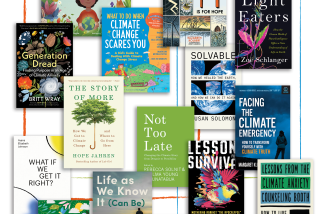What we only dream of, they realized
- Share via
It streaked across the sky like a falling star in a roar of fire and thunder, leaving contrails of glowing debris in its wake.
Thus was the death of Columbia and the humanity in its trust.
We were transfixed by the incongruity. This wasn’t the way the journey was supposed to have ended. Not seven lives lost in a flash of flame on a day as bright as heaven, but the conclusion of a routine flight by a spaceship that had flown many times before.
The order of orbit, reentry and landing had been fixed in our minds since the first flight of the same shuttle 22 years ago: a speck in the sky, a pair of sonic booms and then a seemingly effortless glide to Earth.
But not this time.
While the families and friends of crew members waited at Cape Canaveral and we watched with almost bored anticipation, the streak of light that was Columbia, a vehicle entrusted with seven human lives, gave up its trust to fire, and the journey was done.
“A space shuttle contingency has been declared,” said an amplified NASA voice, in a tone as dry as a Texas desert. The whole world seemed to hesitate in the stunned silence that followed. Columbia had been lost.
Twice now we have been witness, either in person or through the cold eye of television, to shuttles -- and lives -- lost in bursts of fire and smoke. Seventeen years ago, it was Challenger, doomed by icy weather and an innocuous piece of technology called an O-ring.
The post-apocalyptic scenes are always the same. Expressions of horror followed by disbelief, tears, condolences, promises to move on with our explorations in space, then the pondering. How could it have happened? What went wrong?
Accusations and investigations are the result of public disasters, reducing lives to computer images, memos, what ifs and months of enough rhetoric to fill an auditorium. Words, words, words.
What this moment truly amounts to is that the seven men and women who died were explorers, and in the history of exploration, things have gone wrong. The unexpected has a way of intruding on the best laid plans. Did someone err? That’s always a risk. Humans make mistakes. Did machinery fail? That’s possible too. Ships sink, planes crash and spaceships explode.
Although disaster may cause us to hesitate on the brink of seeking new worlds or new ways of thinking, there can be no abandonment of the quests. Columbus, Magellan, De Soto, Ponce de Leon, Lewis and Clark, and every test pilot, deep sea diver and Arctic adventurer who challenged the unknown carried with them not just the knowledge of risk, but also the responsibility of moving us forward. We owe them.
Husband, Ramon, Brown, Anderson, Clark, Chawla, McCool. We took their loss personally, as well we should have. Shared grief reveals the existence of human empathy despite dangerous hostilities that continue to characterize our species. We are not totally reduced to savages yet. We can still cry.
Oddly and tragically, by dying, the seven astronauts who rode Columbia into oblivion have achieved a level of heroism that would not have been theirs had the ship simply landed and they walked away. It’s a peculiarity of human nature to accept discovery as routine once the shine wears off.
But horror has a way of fixing itself in history, and those who rode an awesome vessel of exploration to their doom will be remembered. They were us, with smiles and kids and mortgages and backyard barbecues and things to do once their spaceship, 16 minutes from Earth, settled to the ground.
Like the flight of Icarus, something went wrong. Mythology merged with reality as wings melted and our best efforts failed. Icarus had reached for the sun. We were reaching for truths beyond our earthbound existence. Both journeys ended in fire.
I remember seeing Sputnik almost half a century ago, a small dot in the night sky, and being awed by the very notion that we had lofted a man-made satellite -- our own moon! -- into orbit around the Earth. We were connected to each other then as we are now, our sensibilities linked by the wonder of an event larger than our best dreams or our worst nightmares.
In 1981, my wife and I packed our kids into a camper and braved the crowds at Edwards Air Force Base to watch Columbia, completing the first space shuttle flight in history, land smoothly to wild cheers and flag-waving. Now, I watch as images of Columbia, a falling star, flash in endless replay across our television screens.
I saw it born and I saw it die, and the loss hurts.
*
Al Martinez’s column appears Mondays and Fridays. He’s at al.martinez@latimes.com.
More to Read
Sign up for Essential California
The most important California stories and recommendations in your inbox every morning.
You may occasionally receive promotional content from the Los Angeles Times.













